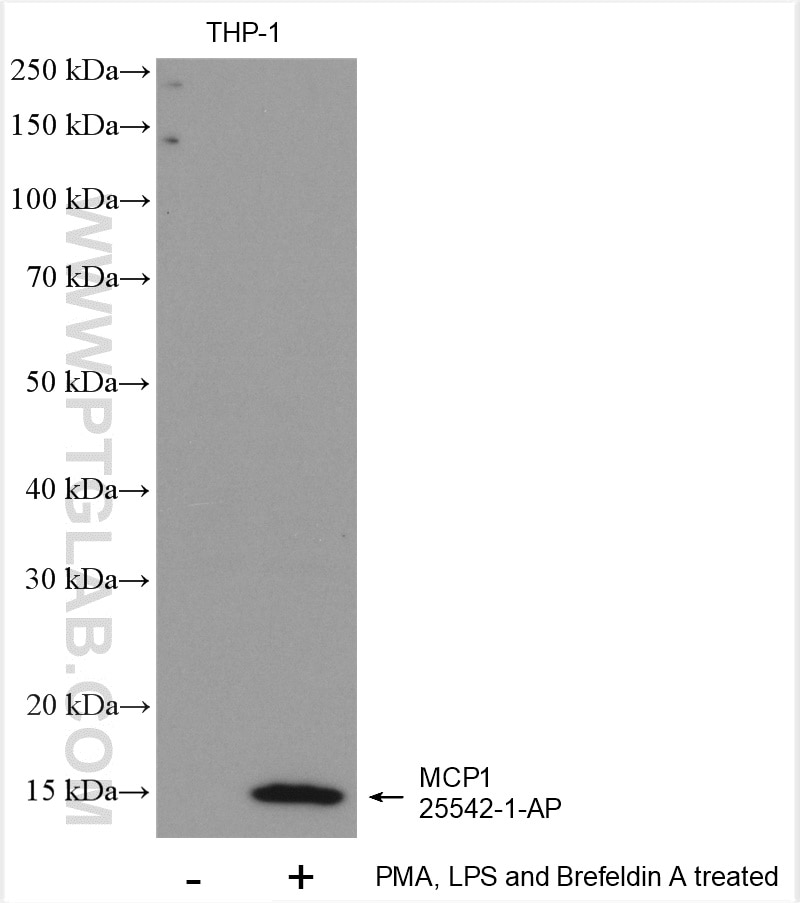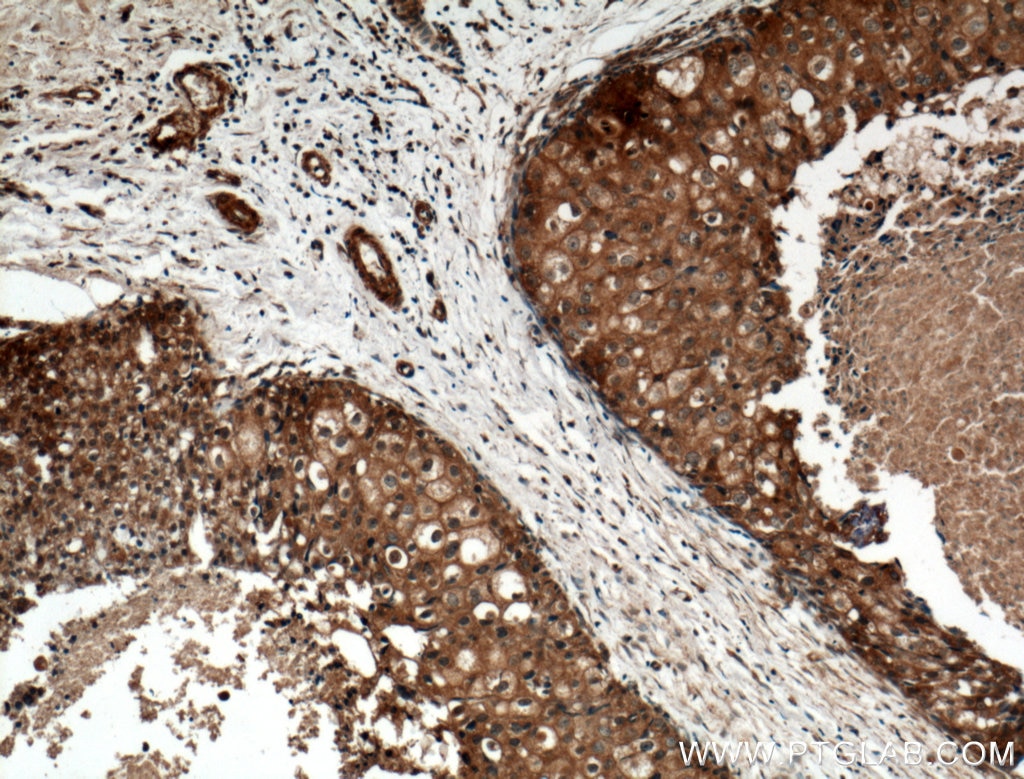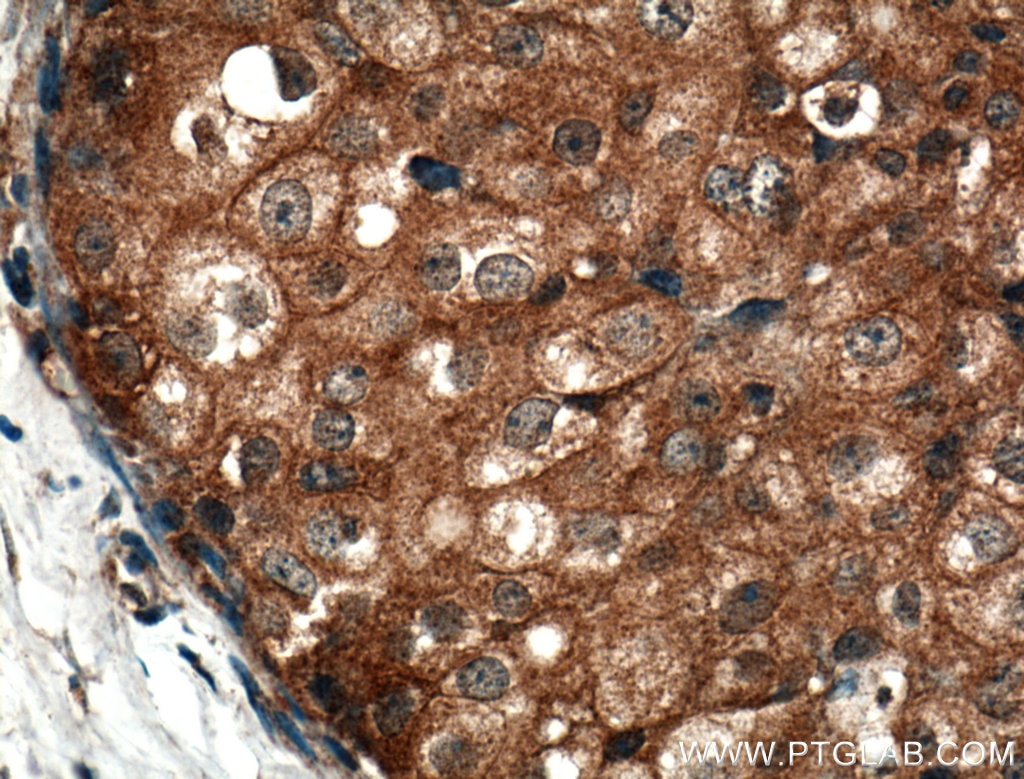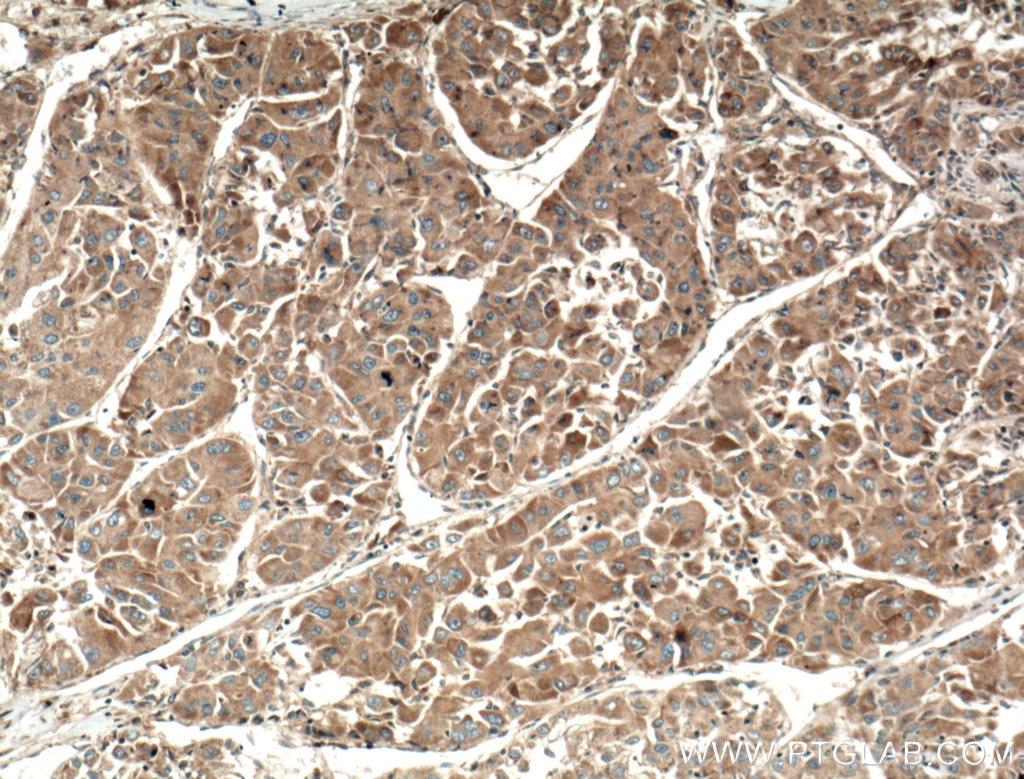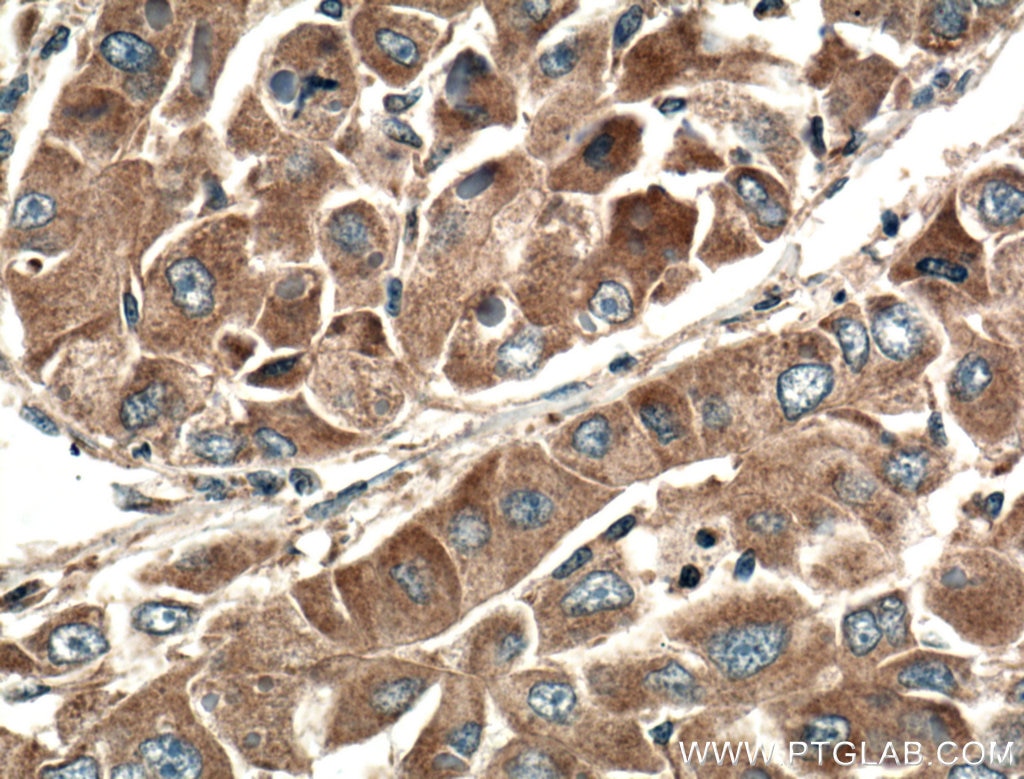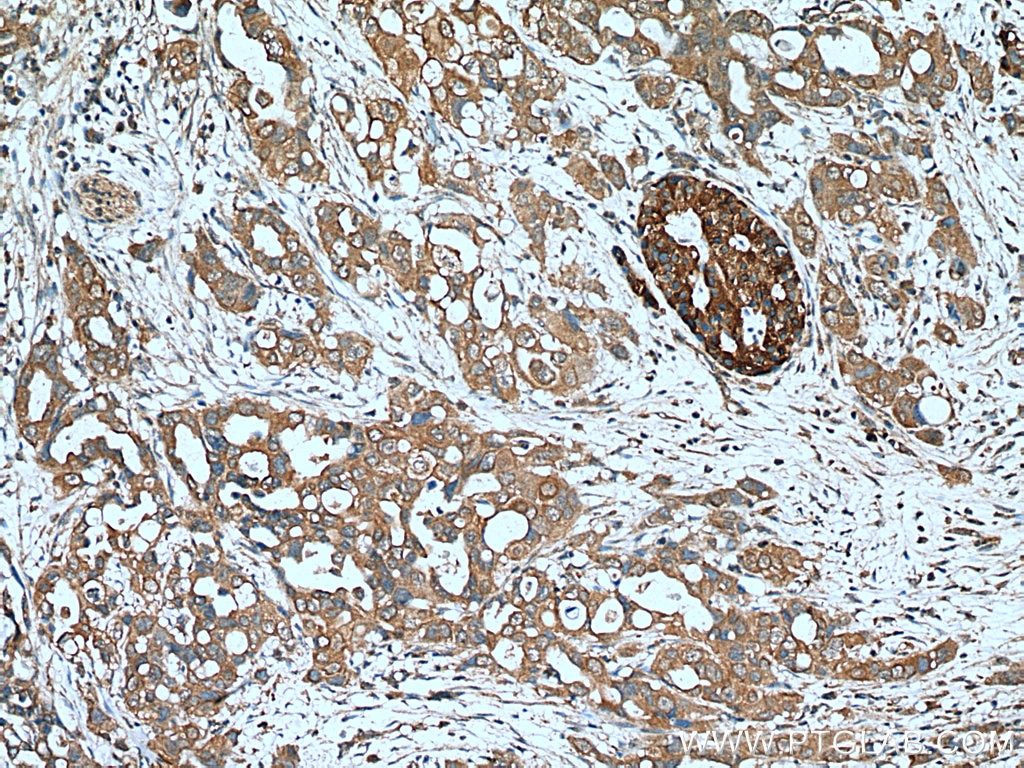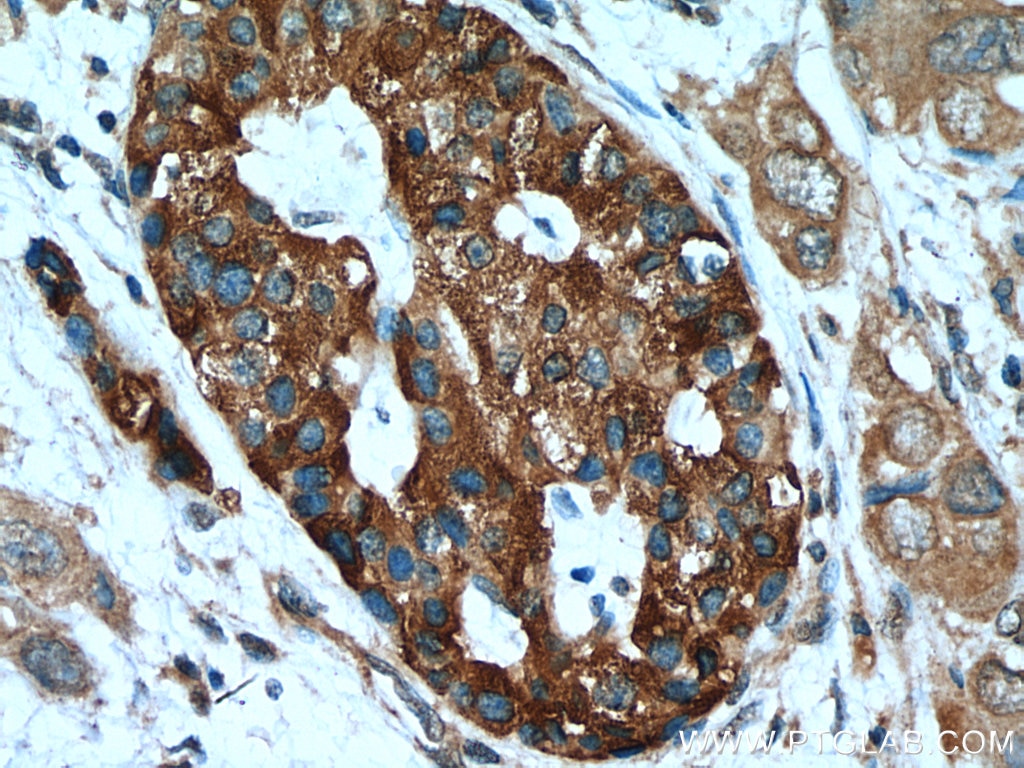MCP1 Polyklonaler Antikörper
MCP1 Polyklonal Antikörper für IHC, ELISA
Wirt / Isotyp
Kaninchen / IgG
Getestete Reaktivität
human und mehr (1)
Anwendung
IHC, IF, ELISA, Blocking
Konjugation
Unkonjugiert
Kat-Nr. : 25542-1-AP
Synonyme
Geprüfte Anwendungen
| Erfolgreiche Detektion in WB | PMA, LPS and Brefeldin A treated THP-1 cells |
| Erfolgreiche Detektion in IHC | humanes Mammakarzinomgewebe, humanes Leberkarzinomgewebe, humanes Pankreaskarzinomgewebe Hinweis: Antigendemaskierung mit TE-Puffer pH 9,0 empfohlen. (*) Wahlweise kann die Antigendemaskierung auch mit Citratpuffer pH 6,0 erfolgen. |
Empfohlene Verdünnung
| Anwendung | Verdünnung |
|---|---|
| Western Blot (WB) | WB : 1:1000-1:4000 |
| Immunhistochemie (IHC) | IHC : 1:50-1:500 |
| It is recommended that this reagent should be titrated in each testing system to obtain optimal results. | |
| Sample-dependent, check data in validation data gallery | |
Veröffentlichte Anwendungen
| IHC | See 29 publications below |
| IF | See 12 publications below |
Produktinformation
25542-1-AP bindet in IHC, IF, ELISA, Blocking MCP1 und zeigt Reaktivität mit human
| Getestete Reaktivität | human |
| In Publikationen genannte Reaktivität | human, Kaninchen |
| Wirt / Isotyp | Kaninchen / IgG |
| Klonalität | Polyklonal |
| Typ | Antikörper |
| Immunogen | MCP1 fusion protein Ag10601 |
| Vollständiger Name | chemokine (C-C motif) ligand 2 |
| Berechnetes Molekulargewicht | 99 aa, 11 kDa |
| Beobachtetes Molekulargewicht | 11 kDa |
| GenBank-Zugangsnummer | BC009716 |
| Gene symbol | MCP-1/CCL2 |
| Gene ID (NCBI) | 6347 |
| Konjugation | Unkonjugiert |
| Form | Liquid |
| Reinigungsmethode | Antigen-Affinitätsreinigung |
| Lagerungspuffer | PBS with 0.02% sodium azide and 50% glycerol |
| Lagerungsbedingungen | Bei -20°C lagern. Nach dem Versand ein Jahr lang stabil Aliquotieren ist bei -20oC Lagerung nicht notwendig. 20ul Größen enthalten 0,1% BSA. |
Hintergrundinformationen
Monocyte chemotactic protein 1 (MCP1; also known as CCL2), is a chemokine that can be expressed in monocytes, macrophages, and endothelial cells, and belongs to the CC subfamily of chemokines. Chemokines are a superfamily of secreted proteins involved in immunoregulatory and inflammatory processes. Research has shown that the expression of MCP1 increases in the serum of patients with acute myocarditis. MCP1 is up-regulated in many types of CNS injury, including ischemia, hemorrhage, trauma, infection, hypoxia, and peripheral nerve axotomy. MCP1 has also been implicated in the pathogenesis of diseases characterized by monocytic infiltrates, such as psoriasis, rheumatoid arthritis, and atherosclerosis.
Protokolle
| PRODUKTSPEZIFISCHE PROTOKOLLE | |
|---|---|
| WB protocol for MCP1 antibody 25542-1-AP | Protokoll herunterladen |
| IHC protocol for MCP1 antibody 25542-1-AP | Protokoll herunterladenl |
| STANDARD-PROTOKOLLE | |
|---|---|
| Klicken Sie hier, um unsere Standardprotokolle anzuzeigen |
Publikationen
| Species | Application | Title |
|---|---|---|
ACS Cent Sci Macrophage Inactivation by Small Molecule Wedelolactone via Targeting sEH for the Treatment of LPS-Induced Acute Lung Injury | ||
Bone Res Osteopontin deficiency promotes cartilaginous endplate degeneration by enhancing the NF-κB signaling to recruit macrophages and activate the NLRP3 inflammasome | ||
J Neurol Neurosurg Psychiatry Molecules of senescent glial cells differentiate Alzheimer's disease from ageing | ||
Cancer Lett LRP1 induces anti-PD-1 resistance by modulating the DLL4-NOTCH2-CCL2 axis and redirecting M2-like macrophage polarisation in bladder cancer | ||
Theranostics Macrophage targeted theranostic strategy for accurate detection and rapid stabilization of the inflamed high-risk plaque. |
